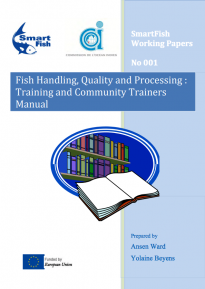Skills and Knowledge for On-board Handling in Small-Scale Fisheries
Understanding the causes of fish spoilage and the benefits of good handling and hygiene practice are basic requirements for the uptake of good on-board handling practice.
There are two important beneficiaries of capacity building: the fishers themselves who carry out the tasks on the vessel; and the owner of the vessel and gear, who will be responsible for investing in any new equipment as well as motivating the crew to change practices.
Some of the key skills and knowledge required in order to prevent and reduce food loss and waste (FLW) include:
- fish quality and safety and what is good quality
- fish and food safety
- fish spoilage and why it happens
- how to maintain fish quality good on board small boats
- the importance of time and temperature
- the use of ice
- how and why to keep fish clean
- how and why to keep equipment clean
- good cleaning practice
- personal hygiene
- how to handle fish with care
- traceability
- hazard analysis and critical control points (HACCP)
Where small-scale vessels supply high value markets including export markets then there is a likelihood that good on board practices will be in use and such examples could be used as a model for education, capacity building and skill development for other fishers and gear owners.
Government agencies can play a role in investing in training. This can include making training and certification mandatory for fishers while also emphasizing the setting of benchmarks and standards. For example, requiring fishers to undergo basic training in fish handling and food safety is one strategy to use in promoting the uptake in knowledge and skills.
National authorities such as Health Inspectorates and Food Standard Agencies require similar skills and knowledge to those required of fishers, in order for them to be able to implement extension for and the enforcement of food law, regulations, standards and certification.
Key Publications
The Use of Ice on Small Fishing Vessels This publication describes the requirements for the use of ice and chilled seawater on board fishing vessels, and gives an overview of the different types of ice plants and the ice produced in them. | |
Fish Handling, Quality and Processing: Training and Community Trainers Manual This document includes information related to food law implementation. |
More Resources
More Resources
31 October 2023
01 October 2023
05 September 2023













